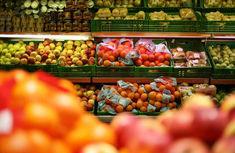
Eight out of 10 shoppers want a watchdog appointed to monitor and penalise supermarkets that treat suppliers unfairly, according to a poll commissioned by Traidcraft.
The poll comes after some supermarkets have been accused of bullying farmers and other suppliers to cut their prices by more than they can afford.
The National Farmers’ Union (NFU) has accused supermarkets of demonstrating the kind of greed towards suppliers that sparked the banking industry crisis.
The NFU alleged retailers are harassing suppliers to slash prices, pay new fees to have their products stocked, give discounts on previously agreed prices, and wait longer for payment.
In the YouGov survey, 81 per cent of people interviewed branded as unacceptable supermarkets’ behaviour, such as paying suppliers less than agreed sums and fining them for short deliveries despite less than a day’s notice.
The poll and research are released by the Cross Cutting Group, a broad alliance which represents more than 500,000 concerned consumers, farmers, and businesses.
The coalition is working towards a UK grocery market which operates on the principle of fair dealing and in consumers’ best interests. The group was established by MP Andrew George and includes Traidcraft, the National Farmers’ Union of England and Wales, parliamentarians, the Campaign to Protect Rural England and Friends of the Earth.
New research by leading economist Professor Roger Clarke has shown that an ombudsman would result in more choice for consumers, better products and, in some cases like agricultural products, lower prices.
Clarke said: “The cost of introducing the grocery ombudsman is likely to be very small compared to the benefits that are likely to follow and, paradoxically, a watchdog would not only benefit consumers, but also serve the needs of supermarkets”.
It is expected that within a month the Competition Commission will launch 30 days of public consultation over its proposals for a stronger code of practice for the grocery trade, including all the major supermarkets. And the commission will also submit to retailers its plans for a watchdog to ensure the code is adhered to.
Most consumers (59 per cent) would consider switching to another supermarket if they found the chain where they did their main shopping had carried out these practices. Eight in 10 (78 per cent) did not know there was no independent body to oversee supermarkets’ relationships with their suppliers.
The watchdog, recommended by the commission’s inquiry report in April 2008, and to be funded by Britain’s 11 biggest grocery retailers, has not been supported by supermarkets such as Asda, Morrisons and Sainsbury’s, which are concerned over its potential cost-raising effect on food prices.
But Clarke says retailers would each pay just 0.005 per cent of their turnover to fund the ombudsman and the benefits to shoppers would outweigh these costs.
In addition, he concludes that if no watchdog emerges, this may bring another commission probe, costing the taxpayer a further £2 million investigation, as well as bringing substantial costs for the supermarkets in legal fees and senior management time.
The commission’s two-year investigation found that the largest supermarkets abuse their buyer power by driving suppliers’ prices down, reducing investment in quality and new products to the detriment of consumers.
Traidcraft senior policy adviser Fiona Gooch said: ‘With the vast majority of shoppers wanting an ombudsman to curb supermarkets which exploit their power by intimidating suppliers, supermarkets ignore this message at their peril. And we urge shoppers to make their views known to their local supermarket and MP.’
MP Andrew George, said: ‘Supermarkets have told us that they put their customers’ best interests first. In view of that, they should heed this new evidence and support the creation of an Ombudsman. If they have nothing to hide they have nothing to fear and everything to gain.
“Customers would feel more reassured and the good public relations from having the endorsement of an independent regulator will benefit those supermarkets which uphold high standards of trading with their suppliers,” he said.



